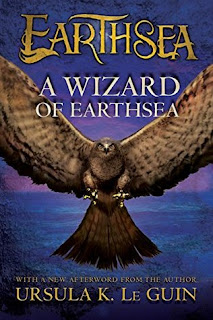My main experience with science fiction and fantasy before then came from borrowing books in my older sister's extensive collection. Her paperbacks were mostly lacking in substance or exceptional authors – with a few golden finds sprinkled in, like The Hobbit.
Then came college and that lit class. The point was to read and discuss excellent examples of sci-fi writing, and the book I loved the most from that class was The Left Hand of Darkness by Ursula K. Le Guin.
I somehow never picked up a title by her again. How is that possible?! I don't know, but I rectified it with A Wizard of Earthsea.
I wish my sister had placed these kinds of books on her shelf. Maybe she did, and I didn't select them from the dozens (hundreds?) she owned. It's written in the style of a magical fable; it feels old-fashioned and familiar, warm and alive. I would've very much enjoyed this book as a child.
Le Guin also made a choice you didn't see from many white writers in 1967, being that many of her characters were not white, including the hero, Ged.
"A great many white readers in 1967 were not ready to accept a brown-skinned hero. But they weren’t expecting one. I didn’t make an issue of it, and you have to be well into the book before you realize that Ged, like most of the characters, isn’t white," she writes in the Afterword (written in 2012). "His people, the Archipelagans, are various shades of copper and brown, shading into black in the South and East Reaches."
She added: "I was bucking the racist tradition, 'making a statement'—but I made it quietly, and it went almost unnoticed."
I enjoyed A Wizard of Earthsea, though it felt a bit more like a Young Adult novel to me. One that adults could certainly enjoy as well, but I think a younger audience could become more enraptured by the magic and myth of this tale.
Le Guin was a gifted writer, and I plan to read more of her work.
If you love talking about books, please follow or friend me on Goodreads. Let's be book buddies!
No comments:
Post a Comment